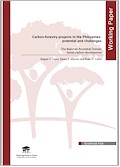| Working Paper Series |
 |
|
| Title | Carbon-forestry projects in the Philippines: potential and challenges: the Ikalahan Ancestral Domain forest-carbon development | | Author | Raquel C. Lopez, Emma Abasolo and Rodel D. Lasco | | Year | 2011 | | Publisher | World Agroforestry Centre (ICRAF) Philippines | | City of Publication | Los Banos, Philippines | | Series Number | Working Paper no. 133 | | Number of Pages | 41 | | Call Number | WP0147-11 | | Keywords | Ikalahan Ancestral Domain, forest carbon, RUPES project, agroforestation, CDM, voluntary carbon market, REDD+ mechanism |
|
| Abstract: |
| The proposed forest carbon development project in the Ikalahan Ancestral Domain aims to improve the environmental and natural resource management of watersheds in Kalahan and lead to participation in the carbon and environmental services markets. This will be done by converting 900 ha of marginal, abandoned agricultural land to productive tree-based systems, improving the livelihoods of communities through agroforestry and protecting the watershed, enhancing biodiversity and improving the aesthetic values of the landscape for potential tourism.
The World Agroforestry Centre Philippines has assisted the Ikalahan, the indigenous people of the region, through their Kalahan Educational Foundation (KEF) by building their capacity to enter into the international carbon markets. KEF initially planned to participate in the market through the United Nations’ Framework Convention on Climate Change’s Clean Development Mechanism (CDM) then later through the Verified Carbon Standards and is now exploring the possibility of engaging with the Reducing Emissions from Deforestation and Degradation plus conservation (REDD+) scheme.
The study was conducted to assess the potential of, and challenges for, the proposed project to participate in carbon trading and rewards for environmental services mechanisms. We wanted to examine the strengths of the proposed forest-carbon development as well as the limitations that are hindering its institutionalisation.
The project will consist of an agroforestation scheme on 900 ha, through 1) planting purely forest trees for reforestation and greater carbon sequestration; and 2) agroforestry farms for livelihoods and lesser carbon sequestration. Total sequestration has been estimated at 89 776 t CO2e over 20 years. The project implementers are the local indigenous people, represented by the KEF.
The prerequisite for any project activity is identification of the area. However, as of 2010, KEF had been able to delineate only 17 parcels of land with aggregate area of 112.27 ha, which is intended for forest tree establishment. The parcels for agroforestry farms had not yet been identified.
Further, KEF had yet to create a comprehensive project plan and prepare a project design document (PDD) following the standard templates required for the carbon markets. KEF needs strategic partners to help them do this, along with the required documents for environmental services registration and crediting. A one-year agreement with Mitsubishi UFJ Securities Co. Ltd. to provide consultancy services to help KEF with such activities had already expired.
We found that aside from the technical limitations of undertaking the planning process, the process of identifying the project area still remained a challenge for the KEF.
Generally, progress has only stemmed from the assistance provided by the World
Agroforestry Centre Philippines through its Rewarding Upland Poor for Environmental
Services (RUPES) project. |
|